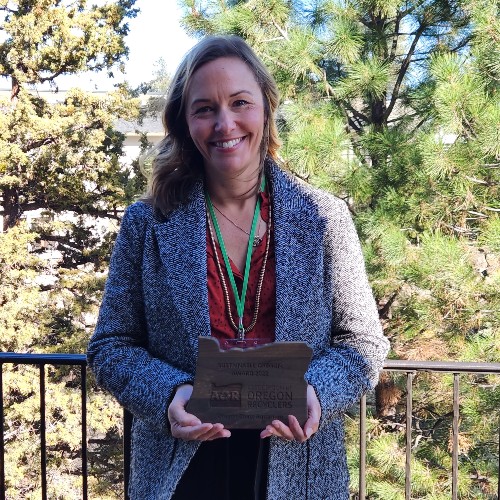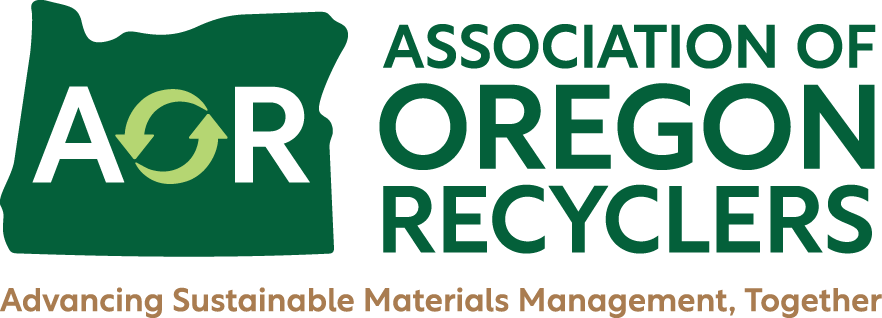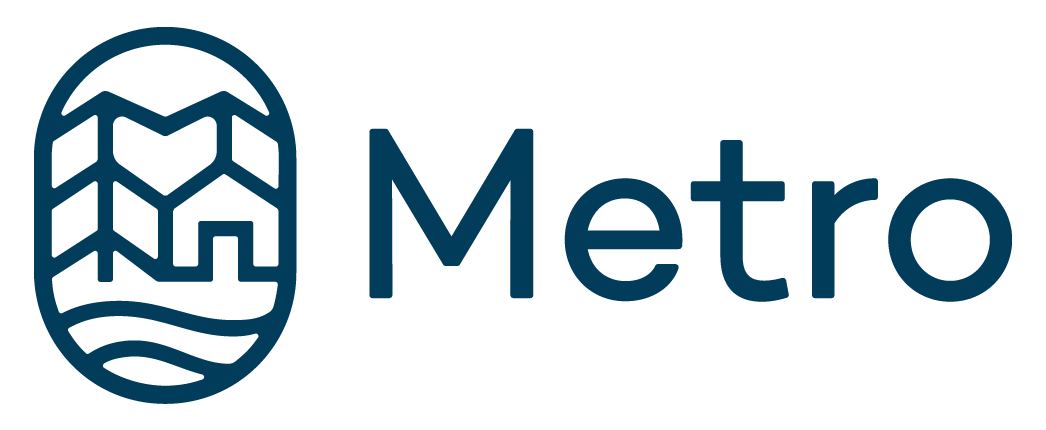AOR Sustainable Oregon 2022 Award Winner: Oregon Coast Aquarium
The Oregon Coast Aquarium is a 501(c)3 nonprofit organization located in Newport. The mission of their organization is to create unique and engaging experiences that connect you to the Oregon coast and inspire ocean conservation. The Aquarium is a living classroom for all learning styles and ages. As one of Oregon’s top tourist attractions, the Aquarium is a vital educational resource for the state, with over 40,000 students visiting the Aquarium each year. In recent years, they have started evaluating their role in how they can conserve oceans and minimize marine debris. As one of the partners in NOAA’s marine debris action plan, they have concentrated on waste reduction and education through programs and practices.
Nominated by Aimee Thompson of Thompson's Sanitary in Lincoln City, Aimee noted the significant accomplishments by the Aquarium. This is what she had to say in her nomination:
"In 2000, the Association of Zoos & Aquariums announced that the Oregon Coast Aquarium was granted accreditation by AZA’s independent Accreditation Commission. AZA Accreditation is a status that denotes the highest standard of animal care and welfare. Accreditation renewal takes place every five years—22 years and 4 renewals later, the Aquarium continues to maintain this status.
The Oregon Coast Aquarium is committed to Sustainability. Over the last ten years, they have developed a Mission, Vision, and Action specifically aimed at sustainability. Their MISSION: We work to integrate sustainability into all aspects of daily operations and continuously grow our green practices. We empower our staff and volunteers to make sustainable choices at work and in their own lives by modeling and communicating green practices across the facility. Their VISION: As a leader for sustainability in Oregon, we incorporate and model best practices across our facility. Our staff and volunteers consciously and regularly make environmentally-responsible decisions which reflect our organization’s sustainability culture and have established a Green Team that meets regularly to discuss ways OCA can improve it’s sustainability, offers sustainability education and monthly challenges to its staff. They have gone on what I call our "Follow the Waste" tour where we visit Garten Recycling Facility, Coffin Butte Landfill, and Pacific Region Compost so they can come back and effectively communicate with staff and visitors about proper waste management.
Here is the work they’ve done in specific areas:
- Reducing plastics: The Gift Shop has switched from plastic price tags to paper, doesn’t offer single-use bags for purchases, and sells a number of sustainable products including metal straws, water bottles, and recycled clothing.
- OCA’s Husbandry Team sanitizes and reuses medical equipment, when possible, uses recyclable gloves, and returns shipping materials to the supplier for reuse.
- The Administrative team recycles printer ink and toner cartridges, purchases pens made from recycled materials, and chooses non-plastic office supplies whenever possible.
- At their Café, they give straws only upon request, and use compostable bio-plastic utensils and cup lids.
- The OCA Marketing team purchases eco-friendly giveaways including zero waste stickers, recycled denim pencils, and bamboo utensils.
- Reducing packaging: OCA has transitioned to digital Membership cards, so they no longer need to print or mail physical cards. They save and reuse most of the boxes, bubble wrap, and other packaging received. They have also created a letter they send to vendors asking them to reduce the amount of packaging they use and providing ideas for some more sustainable alternatives. They have also shared their letter as a template for other businesses and organizations in Newport wanting to do the same.
- Conserving water: They have installed water bottle fill stations across the facility. OCA only uses native plants in landscaping, which require far less water, and irrigate the grounds only when necessary. They also partner with the Surfrider Foundation’s Blue Water Task Force to test the water quality of local beaches every week.
- Helping Ecosystems: The grounds are a Certified Wildlife Habitat and contain only Oregon native plants in the landscaping as well as using only organic, non-toxic fertilizers and weed killers such as vinegar and clove oil. They compost food waste from the Cafe and use as soil and are transitioning to electric rather than gas-powered landscaping tools. Lastly, they participate in beach cleanups and lead annual SOLVE beach cleanups at South Beach State Park. The Aquarium frequently refers to their work as “inside out” meaning they are working on the inner workings of their organization so they can honestly advocate sustainability to the public through their experience and transparency.
- In addition, they host the Annual Oregon Marine Debris Action Plan meeting where they also host workshops for school educators from all over the state; focusing on Oregon Green Schools ideals, sustainability and teaching materials management. OCA have been awarded numerous grants over the years but one of the latest being related to waste reduction and plastic pollution through Oregon Sea Grant. Through it they conducted a study with colleagues from Portland State University in 2021 titled “Aquarium visitor engagement with an ocean plastics exhibit: Effects on self-reported intended single-use plastic reductions and plastic-related environmental stewardship actions” The Abstract: Plastic pollution requires, among a suite of other interventions, education to inspire behavioral change and reduce consumption of single-use items. We designed and installed an ocean plastics exhibit at the Oregon Coast Aquarium in Newport, Oregon, USA. We evaluated visitor engagement and the effects of the exhibit on their reported single-use plastic and plastic-related environmental stewardship intentions. Timed interaction observations (n = 317) revealed children (0–17 years) engaged more with interactive elements than adults (18–80+ years). Ten single-use plastic reduction and plastic stewardship intentions were evaluated through structured questionnaires; the top three behaviors visitors intended to change were: using a reusable straw (37.4%), cleaning the beach (37.4%), and bring-your-own bag to the store or market (33.0%). 18 to 29 year olds had the highest change in desire to address the ocean plastics problem before and after seeing the exhibit, but the lowest likelihood of engaging in either single-use plastics reduction or plastic stewardship actions of all age groups."
The Aquarium has also made significant cultural and economic DEI consideration made and created opportunities for historically underserved or marginalized communities. Amy continued in her nomination:
"In 2019, the Aquarium began a self-examination of the organization’s structure, leadership, programming and population served to learn where disparity and exclusivity persists. This equity work began with DEI training of the administrative team, refining a metric for board diversity, updating policies, and conducting surveys of staff and volunteers to ascertain disparities. Meeting with local school districts, STEM Hub and other collaborators to determine disparity in population served, as well as set strategic direction for enhancing programs.
The Aquarium conducted guest surveys to investigate visitor demographics, motivations, and prior knowledge of ecosystems and conservation. Through this audience research, the Aquarium confirmed that guest demographics do not fully reflect local populations, including low-income and communities of color. As a result of training, survey analysis and input from focus groups representing under-served populations, the Aquarium implemented the following:
- Worked with Centro de Ayuda, Lincoln Co. School Dist. Hispanic Family Liaison (LCSD) and Lincoln County Public Libraries to develop strategies for making the Aquarium more accessible to, and inclusive of BIPoC (particularly Latinx) and low-income families
- Translated ocean science curriculum and signage into Spanish. o Embedded Google Translate into the www.aquarium.org and www.oceanscape-aquarium.org digital learning network websites.
- Offered reduced outreach program fees to Title I, low-income and rural schools o Provided family membership cards for LCSD’s outreach program to include in their ESL kits so that migrant worker families could utilize our facility as a STEAM resource.
- Charged $5 admission to Lincoln Co. residents on Wednesdays, then changed to Sundays to better accommodate working families.
- Charged $1 admission for school field trip students
- Provided free admission and offered onsite and online early learning program to county Headstart and other preschools to engage children who have barriers to learning, including low-income, ESL and sensory challenges.
- Piloted a new Culture Pass, targeting low-income and BIPoC families that may be checked out from Newport, Siletz (located near Siletz tribal community), Lincoln City and Tillamook libraries allowing free Aquarium admission for a family of four.
- Leadership engaged department staff in discussions surrounding the Black Lives Matter movement, and formed a focus to draft the Aquarium’s DEIAJ statement.
- Contracted Jane Waite, Senior Associate for Social Justice Learning and Engagement, and Dir. of the Social Justice Education Initiative from OSU to conduct employee training in fall 2021 – now required of all staff.
- The Aquarium’s board is forming a DEIAJ Committee tasked with developing a DEIAJ Plan, and recruited Paula Miranda (Latinx) to serve on the Advisory Board. The board will conduct annual DEIAJ training.
- Implemented procedures to made accommodations for people with various sensory challenges, ESL and/or differing physical abilities
- Staff took Kulture City’s online course “Sensory Inclusivity” to improve understanding and identify accommodations for children with various sensory challenges.
- In our new admissions annex, we installed a hearing loop to aid visitors with audial ability. Interpretation of new exhibits will be in both English and Spanish
- Some interactive exhibits such as the touch pool are being rebuilt to be ADA accessible.
- Targeted job postings to reach higher percent of BIPoC and women. We have a greater number of women in leadership and science, tech and facilities occupations – more than 63% of staff.
- Changed new employee orientation to require DEIAJ training, and added more inclusive onboarding procedures (i.e.: non-binary pronouns on nametags, business cards and introductions for those who prefer this identification).
- Collaborating with LCSD we are augmenting our Youth Volunteer Training specifically for ESL and migrant family students that will allow them to earn an elective science high school credit. This 6-week training requires a service component that LCSD considers a compelling alternate model for students to learn science content and engage with the public to practice their English language skills.
- As a member of the Coastal Ecosystem Learning Center network, we have been invited to participate on the Climate Resiliency Community of Practice, focusing on climate change’s disproportionate impact on people of color and low-income communities.
Congratulations to th Oregon Coast Aquarium!


